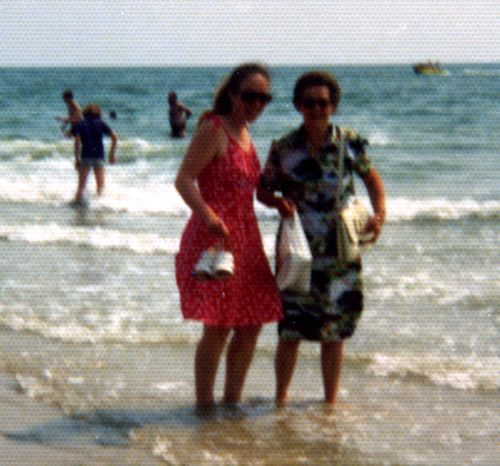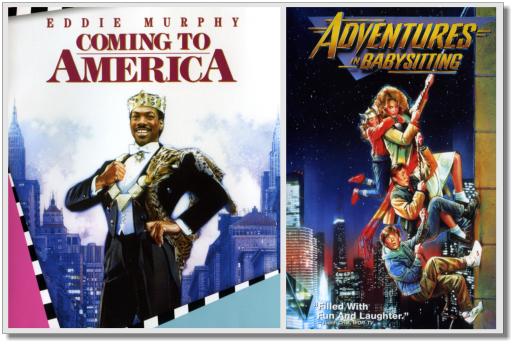2009 — 29 June: Monday
Goodness me, it's been a hot and sticky day. And the forecast is for more of the same. If it would rain, and wash the pollen out of the air, I'd appreciate it. Tonight's photo shows Christa paddling with her Mum — I rather suspect I was toiling in the IBM orifice, and I'd put the date somewhere in the summer of 1982:

... it will have been taken by her Dad. They always seemed to enjoy coming over from Germany to stay with us for a fortnight or so and I enjoyed their visits because Christa got an enormous kick out of them. It always struck me how difficult it must be for someone to leave their family, friends, and country to "set up shop" elsewhere. I am, and will always be, enormously grateful that Christa was willing to do this for me. (I suspect she liked me a bit!)
G'night!
Start the week with a bang
I can usually rely on the New York Times to amaze me:
When Mr. Obama was elected in November, federal instant background checks, the best indicator of gun sales, jumped 42 percent over the previous November. Every month since then, the number of checks has been higher than the year before, although the postelection surge may be tapering off, as all surges eventually do. While the number of checks in April increased 30 percent from the year before, the number of checks in May (1,023,102) was only 15 percent higher than in May 2008.
I particularly liked the pastor quoted in this tiny tale, and his "Not every Christian denomination is pacifist". I hadn't realised those commandments were so, erm, ... versatile.
It's already 26C up here in my study at 09:19, and the sun is just about breaking out behind bright grey clouds. I need some breakfast. But first, an equally short article by Ophelia Benson. Pithy and pointed. Here's my favourite line:
The religious version of being good is not always on the mark, to put it mildly, but even the opportunity to contemplate goodness seems valuable. This is something it's truly hard to reproduce with secular institutions. Politics seems like the closest thing to a substitute, and it's not a very close match.
And Christa used to call me a master of understatement! By the way, did you know you can apply for a research grant in the "big" questions? (Source.) Now that I've finished watching my vampire series, perhaps I should give it a go. (More here.) Sounds less violent than Scientology! (And besides, I never did rate the quality of L Ron Hubbard's science fiction.)
Back to the 80s
I've not actively tried to replace every LaserDisc title I once owned with a corresponding DVD, but when I see a title I enjoyed I do sometimes weaken. So today's gentle "rat-tat" on the door was very welcome. John Landis is an underrated director, and who can claim Elisabeth Shue isn't supremely easy on the eyes?

There was a bitter legal dispute1 between Art Buchwald and the Paramount studio about sharing out a fair proportion of the "net profits" from the Eddie Murphy comedy. Indeed, I believe that's why you no longer see the phrase "net profits" these days. Hollywood accounting is an interesting voodoo branch of the dismal science that is economics.
Meanwhile, another dismal science is cooking up a storm down in my kitchen. Or at least, I hope so. It's 13:01, the glorious Schubert Symphony #9 has just finished, and my intended chicken pie is getting nearly as thermally agitated as I am.
How long, I wonder, before Hollywood signs up to the ideas and business models espoused here? Source and snippet:
Since the falling costs of digital technology let you make as much stuff as you want, Anderson argues, and the magic of the word "free" creates instant demand among consumers, then Free (Anderson honors it with a capital) represents an enormous business opportunity. Companies ought to be able to make huge amounts of money "around" the thing being given away — as Google gives away its search and e-mail and makes its money on advertising.
I was struck (again) by the transistor example: "Today, Intel will sell you two billion transistors for eleven hundred dollars — meaning that the cost of a single transistor is now about .000055 cents." (In 1961 a single transistor would set you back about $10. Still, at least back then the damned thing was big enough to see, hold, and solder!)
First Schubert... and now the glorious romp that is Beethoven's Fifth. How much more aural pleasure can one pair of ears take? (There was an advert that ran regularly in National Lampoon magazine in the 1970s about buying new loudspeakers to give yourself an eargasm.)
I bet Mike thinks I'm mad...
... but when I persuaded him to take a close-up of some wonderfully gnarled bark yesterday, with his new toy, I did so because I was reminded of Yves Tanguy:

Perhaps I am mad, but it's the way my mind works sometimes (and I'm more or less used to it).
Coo, it ain't 'alf 'ot, innit? (And there's no respite before Friday, if I can trust the BBC forecast.) It's 18:24 and about all I can say in favour of the weather is that it certainly speeds up the drying of my laundry.